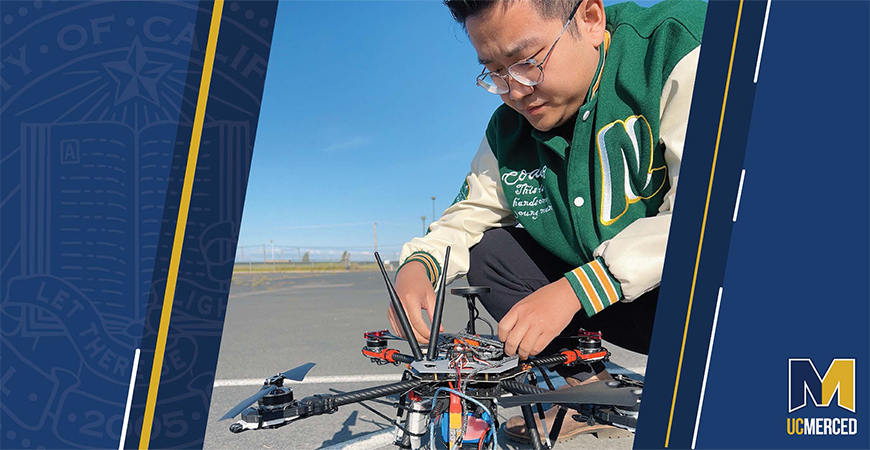
The new UC Merced Farms Food Future innovation initiative is investing in 10 graduate researchers to solve climate and community challenges. Their work is the start of a concerted focus in climate-smart agriculture for the campus.
The $850,000 in funding comes from the U.S. Economic Development Administration's Build Back Better Regional Challenge grant to build new innovation centers. UC Merced does a different kind of agriculture, emphasizing cutting-edge ag-tech research. The campus is one of the leaders of the largest grant awarded among all the coalitions participating: F3 received $65.1 million to jump-start the agritech revolution in the San Joaquin Valley.
Graduate students begin work in the fall. Their creative proposals ranged in subject matter and application from irrigation, digital twins, inclusive innovation and regenerative agriculture.
For Jennifer Alvarez, the work is personal.
"I will realize my lifetime goal of giving back to my local community," she said.
Alvarez will look at the relationships between water use, carbon storage and crop health to find flexibility in our agricultural systems.
"Through collaborative research activities, I will engage my students in local efforts to improve agriculture in the Central Valley while reducing its negative impacts and increasing our economic resiliency."
Similarly, Di An will use drones to assess soil carbon - a key to taking greenhouse gases out of the atmosphere to fight climate change.
"We plan to design a portable device - the size of an iPhone - to transmit microwaves and receive their reflectance to estimate the amount of soil carbon below."
"I believe that this scholarship will not only enhance my ability to conduct high-quality research, but also provide me with the opportunity to collaborate with other scholars and experts in the agricultural field," An said.
Other students are inventing robots and tech innovations to improve water quality or the efficiency of irrigation in the field.
UC Merced's F3 faculty Director Professor Joshua Viers designed the graduate student program to serve the Valley.
"The urgency and intensity of climate change takes experts of all kinds," Viers said. "UC Merced students are intimately familiar with the challenges climate change poses in this region and the need to support the ag sector's adaptation to it. This funding provides them with the network and focus on food systems. We will all benefit from their work."
The departments represented in the inaugural cohort span the campus, demonstrating the diverse nature of agritech issues. Mechanical Engineering, Electrical Engineering and Computer Science, Environmental Systems and Management of Complex Systems graduate groups prepare students for tackling wicked problems, and together they can approach issues from multiple perspectives while training for interdisciplinary team science in the future.
The funding fills the needs of a successful researcher, from travel to conferences and equipment at the new UC Merced Experimental Smart Farm to opportunities to engage with industry and educational partners. Faculty mentors for each graduate student also receive summer salaries to support the agritech innovation community at UC Merced.
Fellows will participate in the F3-sponsored event at FIRA and other F3 events, and connect with community, educational and industry partners, all with the goal of improving the Valley's agricultural systems under climate change.
Learn more about climate-smart agriculture research at f3.ucmerced.edu.




 Public Information Officer
Public Information Officer

